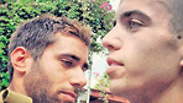

‘As long as Oron isn't home, Protective Edge hasn’t ended’
For the past three and a half years, the Shaul family has been fighting for the return of its son, who was pronounced dead in Operation Protective Edge although his body remains in Hamas hands; in an interview following a rocket attack during a ceremony marking Oron’s 24th birthday, his mother and older brother explain why they decided to hold the event on the Gaza border and why they are so disappointed with the government.
“I wasn’t afraid,” Zehava says, “but I saw everyone running, and they grabbed me and started rushing me. As far as I was concerned, I would have remained seated, but people around me were afraid. I can understand them. I felt like I finally understood what the southern residents are going through, and the truth is, I really felt sorry for them at that moment. On the other hand, I know Oron went to defend the people who live there and suffer from rockets and Code Red alarms. He went and protected them with his body.”
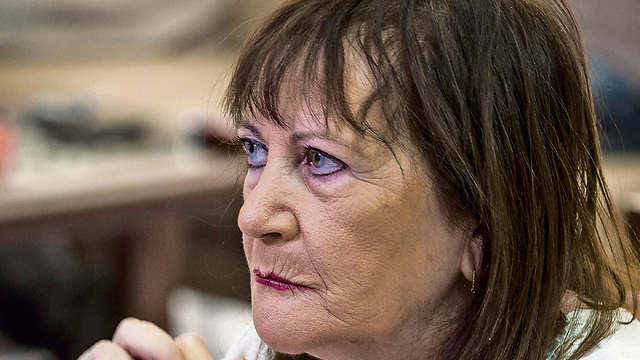
Deep down in Zehava Shaul’s heart, Oron is still alive. She won’t let go of the hope he would one day come home, and that hope gives her the power to keep fighting.
“As far as I’m concerned, as long as Oron and the boys (Hadar Goldin, whose body is also held by Hamas, and Abera Mengistu, who went missing after crossing into Gaza) haven’t returned to Israeli territory, as long as they haven’t come home—Operation Protective Edge hasn’t ended. I hope next year we won’t mark his birthday but rather celebrate his birthday together with him.
“Oron is being held by Hamas. We don't know what his condition is. We are living in complete uncertainty ... Up until a year and two months ago, we had one empty chair around our table, Oron’s chair. Now, unfortunately, we have two empty chairs. My husband Herzl took it very hard and died of cancer.”
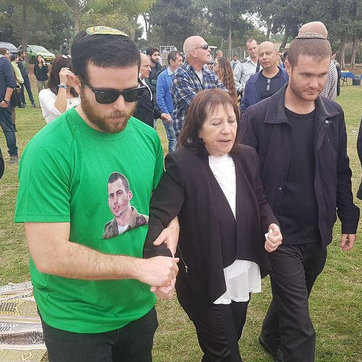
Last Friday, Aviram Shaul stood on the stage in Kfar Aza and addressed the many people who had come to pay their respects to his brother Oron, including public figures, artists and cultural figures, and complete strangers.
“Standing there and speaking in front of the people who had arrived to honor this day, the family, and Oron, people who had come from far away, from all parts of the country—that situation surprised me and strengthened me,” he says.
“Standing there on that stage, with Gaza and Saja’iyya behind me, knowing that a few years ago I had been there myself, in green IDF uniform, with a weapon hanging on my right side ... and thinking about what the Shalit family was going through. It’s not that I’m comparing Gilad’s story to Oron, but it’s the same feeling.
“On Friday, when I stood there, I completely shuddered at that moment, especially when they fired mortar shells at us. And I won’t let anyone convince me otherwise—they fired with the intention of disrupting our event. I have no doubt about it.”
Did you consider that possibility before the event?
“We knew they would provoke us, but I didn’t know it would go that far. Afterwards, they organized a parade and a march with Oron’s pictures. I received videos and images from the army, which I didn’t dare open, because I know it’s pointless. On his last birthday, I opened one video and regretted it that very moment. These are videos produced by Hamas with the goal of manipulating the family, so that we might surrender in some sense. So after the other side bombed and fired (rockets), and then everyone came back and sat down, it made me feel so good.”
‘All I know is my brother has been kidnapped’
It happened on Sunday, July 20, 2014. In an incident which was later referred to as "the APC disaster," Golani fighters—including Oron—entered Gaza's Saja’iyya neighborhood. The armored personnel carrier they were using was old and unfortified, and after it got stuck due to a technical malfunction, it was hit by an anti-tank missile and immediately caught fire.
Six of the fighters who were on the vehicle were pronounced dead after a complicated identification process: Staff Sergeant Max Steinberg, Sergeant Shahar Ta'aseh, Staff Sergeant Daniel Pomerantz, Sergeant Sean Mondshein, Sergeant Ben Vanunu and Staff Sergeant Oren Noach. Sergeant Oron Shaul was missing.
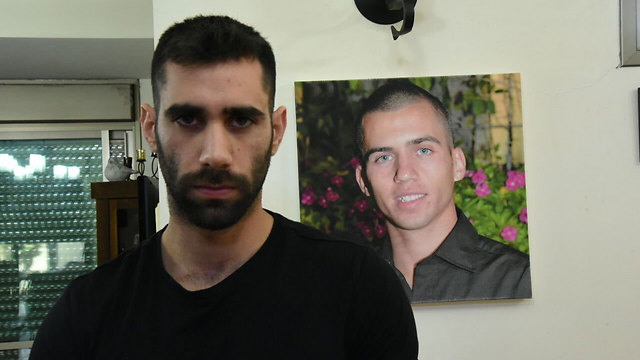
That same day, Aviram, Oron’s eldest brother, was preparing to enter Gaza after being called up for reserve duty.
“I got the message on a WhatsApp group, and I saw Oron’s name there. I saw it, and I stopped breathing for several moments. I said to myself, ‘Those are just words, just letters composing the name Oron Shaul.’ I couldn’t comprehend it. Only when I got on the bus, on the way to Gaza, I realized I should perhaps tell someone, that if I went in—the way out would be much more complicated, and that I shouldn’t keep repressing it. There was a lot of disinformation. Today we are in a completely different point from where we were when I came home that night.”
Tell me about that night.
“Before entering the house, I thought I was about to bury my brother within a few hours, but then I went into a situation in which I didn't know if my brother were alive or dead. All I knew was he’s been kidnapped. That’s also a problem for the army to draw its own conclusions.”
The family withdrew into their home and waited for a miracle, but the miracle failed to arrive. At the end of an unbearable week, the head of the IDF Manpower Directorate at the time, Maj.-Gen. Orna Barbivai, arrived at the house with the chief military rabbi. They gave the Shaul family the worst news of all: The IDF had determined that Oron was dead, and he was halachically considered “a soldier killed in action whose place of burial is unknown.”
The family spent Shabbat deliberating whether to accept the IDF’s ruling. On Sunday, the family members agreed to accept the IDF’s stance and began sitting shiva (the seven-day Jewish mourning period) for Oron. Today, however, the family members refuse to accept the unequivocal ruling about his fate.
Are you angry you were led to sit shiva for Oron?
“It’s hard for me to say I was ‘angry.’ We were in a situation where everything was vague. We were simply shocked. Those days were difficult to get through. We just wanted it all to end, and someone on the other side apparently used it against us and to their advantage. I can’t define it any other way. If it had happened today, and people asked me if I should sit shiva, I would say, ‘Definitely not.’ I don’t usually regret things I’ve done, but this is something I regret.”
You lost your father as well a little over a year ago.
“Father’s death is 100 percent related to Oron’s loss. Father was a very introvert person who believed in the system. He had complete faith in the system, and especially in Bibi (Prime Minister Benjamin Netanyahu), and it’s no secret that he let us down. Father would come out of his conversations with Bibi with tears in his eyes.
“Father was a great Zionist. The love of the land, which he instilled in Oron and in me, was engraved into his heart, and he was disappointed. The fact he didn’t know what was going on with Oron penetrated deep into his body. At the very beginning of this whole nightmare, father was the dominant figure at home. He knew how to calm us down, lift our spirits when needed. It slowly faded away, and I found myself becoming the father of the house.”
‘The government must come to its senses’
I met the Shaul family three and a half years ago, during those horrible days of waiting at the family home in the northern community of Poria Illit. Even after they decided to sit shiva, the family members never stopped believing Oron had survived the APC explosion and was still alive.
“We were very close, in age too,” Aviram says. “Oron matured in the army, and it brought us amazingly closer. Today, in my relationship with Ofek, our little brother, I feel as if he’s already after his military service and university studies. Unfortunately, what he experienced made him grow up very quickly.”
“Time flies, and Oron is still there,” Zehava adds painfully. “The hole in my heart has become much bigger, because every day he’s there the horrible questions keep building up: Is he in good condition? How are they treating him? Was he wounded? These thoughts are incredibly painful. For us, time has stood still. We keep thinking what to do to bring Oron back to us.”
During the first few months, you conveyed full confidence in Israel’s leadership, in the government and in the army. Do you still have faith in them today?
“That was Herzl’s line of thought. He trusted the state and the government. When he realized it wasn’t so, it ate him up, he became ill with cancer and died. He left me alone. On his deathbed, he said to me: ‘Zehava, don’t let go. Do everything to bring Oron back. I promised him we would do that, and I intend to fulfill his wish.”
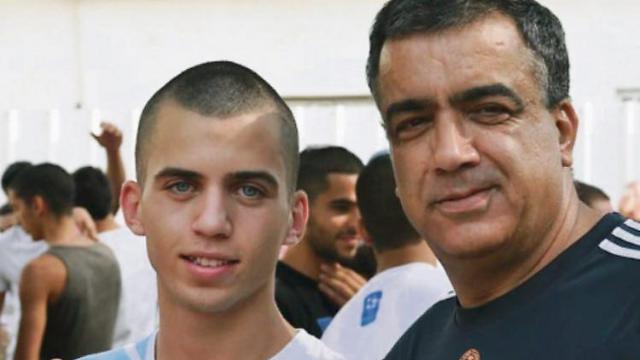
“I expect the government to come to its senses, look into previous cases of POWs and MIAs in the not-so-distant past and see if there was any other case in which we had no clue for three years, like in Oron’s case,” Aviram says. “We have made no progress. Most Knesset members and most ministers no longer speak about Oron, and it’s sad. It shows how much lack of empathy and insensitivity there is towards this issue.”
Do you think the government is responsible for this situation?
“As soon as (POWs and MIAs coordinator) Lior Lotan quit, I realized that the rot starts at the top, that the problem is here in the State of Israel. The problem is at the top. If the POWs and MIAs coordinator resigns, something must really be wrong. When Yaron Blum was appointed, he brought a new spirit, and I hope he will solve this. I hope that next year, God willing, we won’t just mark Oron’s birthday but celebrate his birthday.”
What do you think about the High Court’s ruling against holding terrorists' bodies as a bargaining chip?
“The court handed the issue over to the Knesset to enact a law that would allow Israel to hold bodies. Let’s see how much the Knesset really cares and how sensitive it really is to the issue.”
Do you expect them to enact such a law?
“I don’t expect anything. I stopped expecting a long time ago. I’d like to see what happens.”















